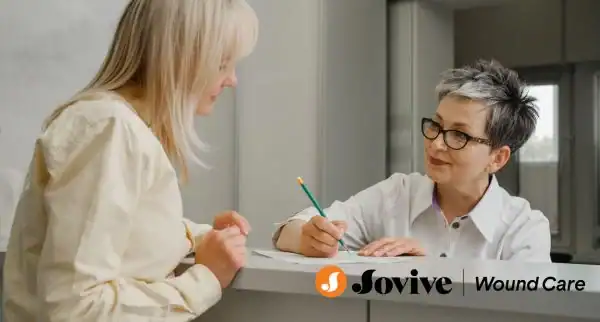When it comes to wound care, what happens outside the exam room can be just as important as what happens inside.
When people think about wound care, they often picture bandages, special dressings, or procedures like debridement. But healing takes more than just clinical treatments. It takes a team—one that sees the big picture, listens closely, and makes sure patients feel supported every step of the way.
At Jovive Wound Care, we believe true healing goes beyond the bandage. Our clinic teams work hard behind the scenes to make sure patients don’t just get treated—they get the right care, at the right time, with fewer barriers in the way.
Tina Diaz, Clinic Manager at Jovive Wound Care, explains it best:
“A wound isn’t just a wound. There’s almost always a larger picture. Our job is to help connect the dots.”
Real Advocacy. Real Impact.
One story Tina shared shows just how powerful this kind of care coordination can be.
A couple came to our clinic looking for help. The wife had a leg wound that hadn’t healed in nearly four years. She’d tried treatment after treatment—but nothing worked.
When our provider examined her wound, he noticed something alarming. This wasn’t just a slow-healing sore. It might be something more serious.
Tina acted fast. She picked up the phone and called a dermatologist we trust. She explained the urgency, scheduled the appointment herself, and made sure the patient was seen quickly.
“It wasn’t just about booking an appointment,” Tina said. “It was about showing the family that someone was advocating for them.”
This kind of personalized attention can mean the difference between a delay and a diagnosis—between a wound that lingers and one that starts to heal.
What Is Care Coordination, Really?
At Jovive Wound Care, care coordination means more than managing appointments. It’s a whole strategy built around removing obstacles and empowering patients.
Our team often:
- Calls patients directly after referrals so nothing gets missed
- Helps patients understand and navigate insurance
- Assists with transportation (yes, insurance often covers rides!)
- Offers clear, caring education for patients and families
In one recent case, a patient nearly skipped her visit because the clinic seemed too far away. But our team reminded her that her insurance included transportation—and helped her set it up. She came in, got care, and began to heal.
Why It Matters for Your Doctor, Too
When you’re referred to a specialist, it’s easy for things to fall through the cracks. That’s why we also prioritize keeping your primary doctor or referring provider in the loop.
We:
- Give timely updates on your progress
- Are available by phone for urgent cases
- Make it easy to share records and collaborate across care teams
As Tina says, “If we keep everyone aligned, the patient doesn’t fall behind.”
Healing Is a Journey—Let’s Make It Smoother
Whether you’re dealing with a stubborn wound or helping a loved one heal, know this: you don’t have to do it alone. At Jovive Wound Care, we’re here to support your whole healing journey—from your first visit to your last follow-up.
Need help navigating wound care or wondering if a specialist is right for you? We’re here to guide you.
When Should You See a Wound Care Specialist?
If a wound isn’t healing after about four weeks, or seems to be getting worse, it’s time to talk to a specialist. Early treatment can prevent serious complications—and save time, money, and stress in the long run.
Want to learn more?
This article is part of our series exploring how advanced wound care is changing lives. For more insights, check out the full interview with Tina Diaz, Clinic Manager at Jovive Wound Care, and Dr. Edward Cho, National Physician Director of Outpatient Medicine at Vituity.


